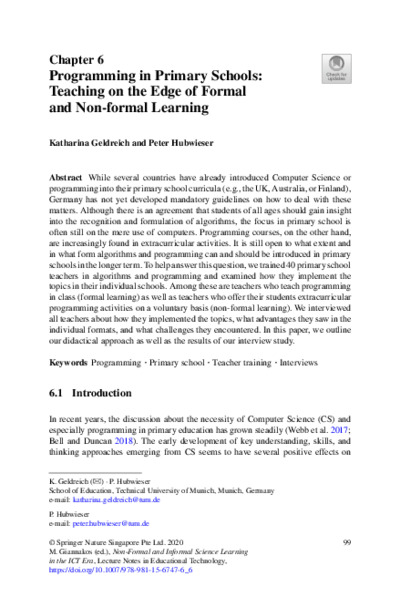 Zusammenfassungen
Zusammenfassungen

 While several countries have already introduced Computer Science or programming into their primary school curricula (e.g., the UK, Australia, or Finland), Germany has not yet developed mandatory guidelines on how to deal with these matters. Although there is an agreement that students of all ages should gain insight into the recognition and formulation of algorithms, the focus in primary school is often still on the mere use of computers. Programming courses, on the other hand, are increasingly found in extracurricular activities. It is still open to what extent and in what form algorithms and programming can and should be introduced in primary schools in the longer term. To help answer this question, we trained 40 primary school teachers in algorithms and programming and examined how they implement the topics in their individual schools. Among these are teachers who teach programming in class (formal learning) as well as teachers who offer their students extracurricular programming activities on a voluntary basis (non-formal learning). We interviewed all teachers about how they implemented the topics, what advantages they saw in the individual formats, and what challenges they encountered. In this paper, we outline our didactical approach as well as the results of our interview study.
While several countries have already introduced Computer Science or programming into their primary school curricula (e.g., the UK, Australia, or Finland), Germany has not yet developed mandatory guidelines on how to deal with these matters. Although there is an agreement that students of all ages should gain insight into the recognition and formulation of algorithms, the focus in primary school is often still on the mere use of computers. Programming courses, on the other hand, are increasingly found in extracurricular activities. It is still open to what extent and in what form algorithms and programming can and should be introduced in primary schools in the longer term. To help answer this question, we trained 40 primary school teachers in algorithms and programming and examined how they implement the topics in their individual schools. Among these are teachers who teach programming in class (formal learning) as well as teachers who offer their students extracurricular programming activities on a voluntary basis (non-formal learning). We interviewed all teachers about how they implemented the topics, what advantages they saw in the individual formats, and what challenges they encountered. In this paper, we outline our didactical approach as well as the results of our interview study. Dieses Kapitel erwähnt ...
Dieses Kapitel erwähnt ...
 Zitationsgraph
Zitationsgraph
 Zitationsgraph (Beta-Test mit vis.js)
Zitationsgraph (Beta-Test mit vis.js)
 Zeitleiste
Zeitleiste
 4 Erwähnungen
4 Erwähnungen 
- WiPSCE '22 - The 17th Workshop in Primary and Secondary Computing Education, Morschach, Switzerland, 31 October 2022 - 2 November 2022 (Mareen Grillenberger, Marc Berges) (2022)

- 6. Gender-dependent Contribution, Code and Creativity in a Virtual Programming Course (Isabella Graßl, Gordon Fraser) (2022)


- 6. Gender-dependent Contribution, Code and Creativity in a Virtual Programming Course (Isabella Graßl, Gordon Fraser) (2022)
- Programmieren in der Grundschule - Eine Design-Based-Research-Studie (Katharina Geldreich) (2023)


- WIPSCE '23 - The 18th WiPSCE Conference on Primary and Secondary Computing Education Research (Sue Sentance, Mareen Grillenberger) (2023)
- Impact of Hint Content on Performance and Learning - A Study with Primary School Children in a Scratch Course (Luisa Greifenstein, Markus Brune, Tobias Fuchs, Ute Heuer, Gordon Fraser 0001) (2023)


- Impact of Hint Content on Performance and Learning - A Study with Primary School Children in a Scratch Course (Luisa Greifenstein, Markus Brune, Tobias Fuchs, Ute Heuer, Gordon Fraser 0001) (2023)
- Aufbau fachwissenschaftlicher und fachdidaktischer Informatikkompetenzen bei Grundschullehramtsstudierenden (Christin Nenner) (2024)



 Anderswo finden
Anderswo finden
 Volltext dieses Dokuments
Volltext dieses Dokuments
 |  Programming in Primary Schools: Teaching on the Edge of Formal and Non-formal Learning: Artikel als Volltext bei Springerlink ( Programming in Primary Schools: Teaching on the Edge of Formal and Non-formal Learning: Artikel als Volltext bei Springerlink ( : :  , 505 kByte; , 505 kByte;  : :  ) ) |
 Anderswo suchen
Anderswo suchen 
 Beat und dieses Kapitel
Beat und dieses Kapitel
Beat hat Dieses Kapitel während seiner Zeit am Institut für Medien und Schule (IMS) ins Biblionetz aufgenommen. Beat besitzt kein physisches, aber ein digitales Exemplar. Eine digitale Version ist auf dem Internet verfügbar (s.o.). Es gibt bisher nur wenige Objekte im Biblionetz, die dieses Werk zitieren.











 design thinking
design thinking micro:bit
micro:bit















 Biblionetz-History
Biblionetz-History